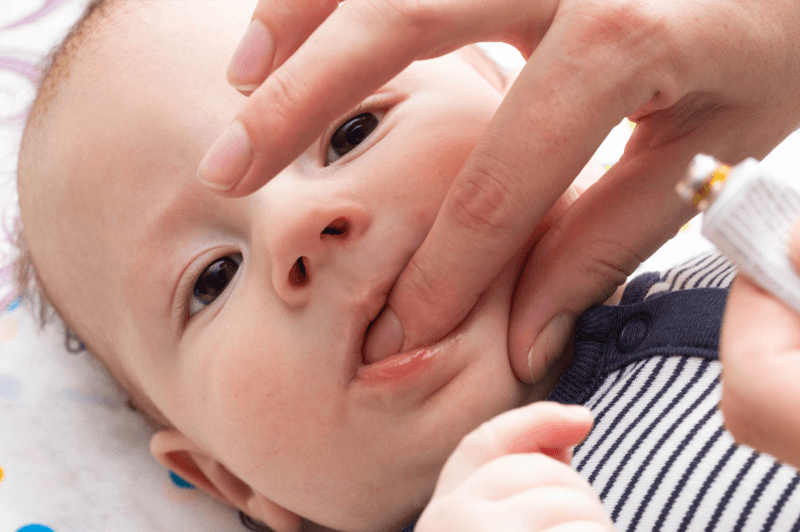The emergence of the first teeth is an important milestone in a baby’s development. While it’s a natural and necessary stage, it can be an uncomfortable period for both the little one and the parents. Recognizing the signs and symptoms associated with teething and knowing how to alleviate discomfort can make this process smoother for everyone.
Signs and Symptoms of the First Teeth
• Swollen and Red Gums: One of the first indications of the teeth coming in is swelling and redness in the baby’s gums.
• Excessive Drooling: During this period, it’s common for babies to drool more than usual.
• Biting Objects: The baby may want to bite everything within reach, from toys to their own hands, in an attempt to relieve pressure on the gums.
• Irritability: Gum discomfort can make the baby more irritable and fussy.
• Difficulty Sleeping: Discomfort can disturb the baby’s sleep, making them more restless at night.
• Refusal of Food: Some babies may refuse food, especially if being spoon-fed, as pressure on the sore spot can cause pain.
• Red Cheeks: It’s common for the baby’s cheeks to become reddened.
• Mild Fever: Although controversial, some babies may experience a low-grade fever. However, it’s crucial to consult a doctor to rule out other causes.
Tips for Alleviating Discomfort
• Chilled Teethers: Teethers placed in the refrigerator (not the freezer) can offer relief when bitten by the baby.
• Gum Massage: Using a clean finger, you can gently massage the baby’s gums.
• Cold Washcloths: A clean, damp washcloth, chilled in the refrigerator, can be offered for the baby to bite.
• Cold Foods: If the baby is already in the solid food stage, cold foods like fruits can help.
• Avoid Sugary Foods: Sugary foods can exacerbate pain and cause cavities in newly emerged teeth.
• Medication: In cases of intense pain, a doctor may recommend age- and weight-appropriate pain relievers.
• Oral Hygiene: Even before the first teeth appear, it’s important to keep the baby’s mouth clean, using gauze or damp cloths.
Conclusion
The emergence of the first teeth is a transition and learning phase for both babies and parents. Recognizing the signs and symptoms and knowing how to relieve discomfort is essential to ensure that this period is as smooth as possible. Remember that each baby is unique, and what works for one may not work for another. The most important thing is to be attentive to your child’s needs and seek medical guidance whenever necessary.
Disclaimer
The information presented in this article is purely informative. While we aim to provide general guidance on the emergence of the first teeth, it is essential to consult a physician or pediatric dentist to discuss any concerns or decisions related to your baby’s oral health. No information in this article can replace the knowledge and judgment of a health professional.
